情绪智力量表资料
情绪智力量表及评分标准完整版
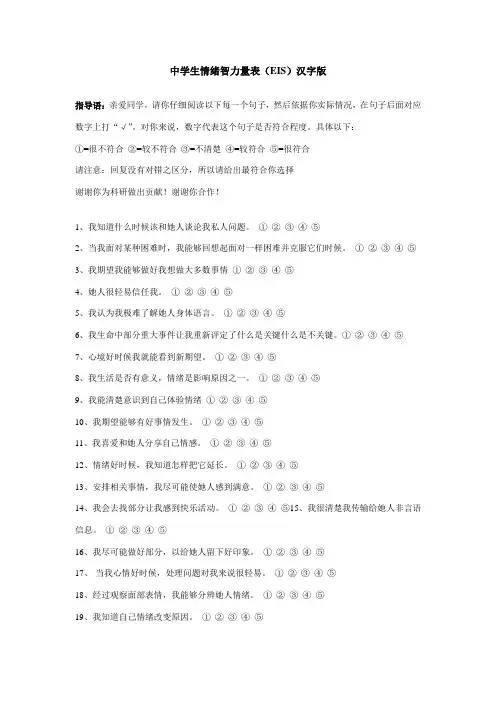
中学生情绪智力量表(EIS)汉字版指导语:亲爱同学,请你仔细阅读以下每一个句子,然后依据你实际情况,在句子后面对应数字上打“√”。
对你来说,数字代表这个句子是否符合程度。
具体以下:①=很不符合②=较不符合③=不清楚④=较符合⑤=很符合请注意:回复没有对错之区分,所以请给出最符合你选择谢谢你为科研做出贡献!谢谢你合作!1、我知道什么时候该和她人谈论我私人问题。
①②③④⑤2、当我面对某种困难时,我能够回想起面对一样困难并克服它们时候。
①②③④⑤3、我期望我能够做好我想做大多数事情①②③④⑤4、她人很轻易信任我。
①②③④⑤5、我认为我极难了解她人身体语言。
①②③④⑤6、我生命中部分重大事件让我重新评定了什么是关键什么是不关键。
①②③④⑤7、心境好时候我就能看到新期望。
①②③④⑤8、我生活是否有意义,情绪是影响原因之一。
①②③④⑤9、我能清楚意识到自己体验情绪①②③④⑤10、我期望能够有好事情发生。
①②③④⑤11、我喜爱和她人分享自己情感。
①②③④⑤12、情绪好时候,我知道怎样把它延长。
①②③④⑤13、安排相关事情,我尽可能使她人感到满意。
①②③④⑤14、我会去找部分让我感到快乐活动。
①②③④⑤15、我很清楚我传输给她人非言语信息。
①②③④⑤16、我尽可能做好部分,以给她人留下好印象。
①②③④⑤17、-当我心情好时候,处理问题对我来说很轻易。
①②③④⑤18、经过观察面部表情,我能够分辨她人情绪。
①②③④⑤19、我知道自己情绪改变原因。
①②③④⑤20、心情好时候,新奇想法就会多部分。
①②③④⑤21、我能够控制自己情绪。
①②③④⑤22、我很清楚自己在某一刻情绪。
①②③④⑤23、学习时我会想象自己立即取得好成绩,以激励自己。
①②③④⑤24、当她人在某个方面做很好时,我会称赞她们。
①②③④⑤25、我能够了解她人传输给我非言语信息。
①②③④⑤26、当她人告诉我她人生中某件重大事件时,我几乎感觉到好象发生在自己身上一样。
巴昂的情绪智力模型及情商量表简介
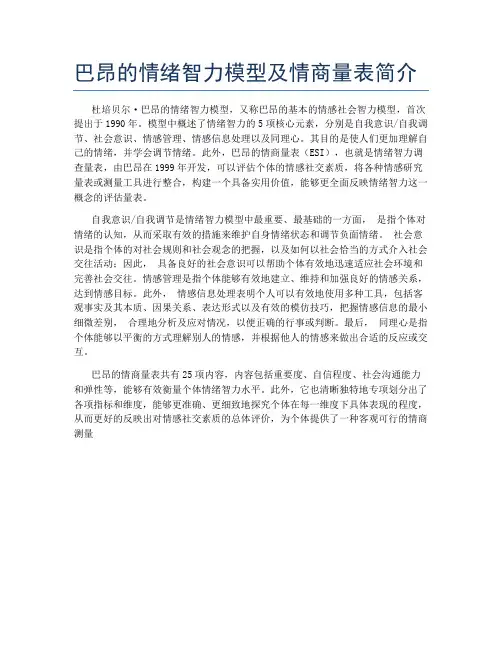
巴昂的情绪智力模型及情商量表简介
杜培贝尔·巴昂的情绪智力模型,又称巴昂的基本的情感社会智力模型,首次提出于1990年。
模型中概述了情绪智力的5项核心元素,分别是自我意识/自我调节、社会意识、情感管理、情感信息处理以及同理心。
其目的是使人们更加理解自己的情绪,并学会调节情绪。
此外,巴昂的情商量表(ESI),也就是情绪智力调查量表,由巴昂在1999年开发,可以评估个体的情感社交素质,将各种情感研究量表或测量工具进行整合,构建一个具备实用价值,能够更全面反映情绪智力这一概念的评估量表。
自我意识/自我调节是情绪智力模型中最重要、最基础的一方面,是指个体对情绪的认知,从而采取有效的措施来维护自身情绪状态和调节负面情绪。
社会意识是指个体的对社会规则和社会观念的把握,以及如何以社会恰当的方式介入社会交往活动;因此,具备良好的社会意识可以帮助个体有效地迅速适应社会环境和完善社会交往。
情感管理是指个体能够有效地建立、维持和加强良好的情感关系,达到情感目标。
此外,情感信息处理表明个人可以有效地使用多种工具,包括客观事实及其本质、因果关系、表达形式以及有效的模仿技巧,把握情感信息的最小细微差别,合理地分析及应对情况,以便正确的行事或判断。
最后,同理心是指个体能够以平衡的方式理解别人的情感,并根据他人的情感来做出合适的反应或交互。
巴昂的情商量表共有25项内容,内容包括重要度、自信程度、社会沟通能力和弹性等,能够有效衡量个体情绪智力水平。
此外,它也清晰独特地专项划分出了各项指标和维度,能够更准确、更细致地探究个体在每一维度下具体表现的程度,从而更好的反映出对情感社交素质的总体评价,为个体提供了一种客观可行的情商测量。
情绪智力量表(EIS)及评分标准(最新整理)
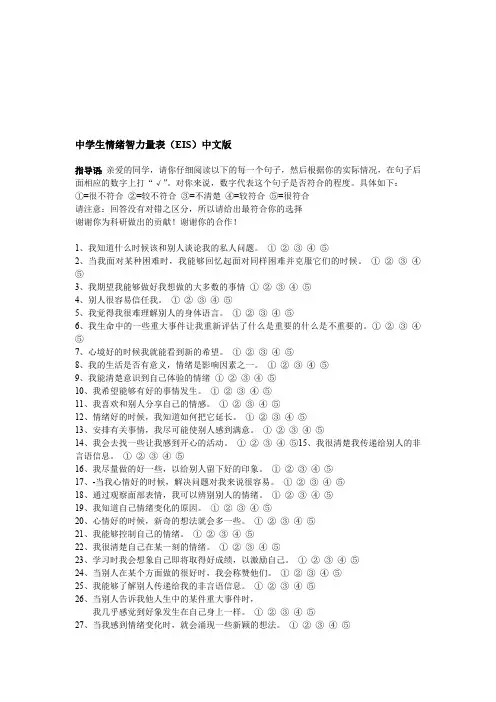
中学生情绪智力量表(EIS)中文版指导语:亲爱的同学,请你仔细阅读以下的每一个句子,然后根据你的实际情况,在句子后面相应的数字上打“√”。
对你来说,数字代表这个句子是否符合的程度。
具体如下:①=很不符合②=较不符合③=不清楚④=较符合⑤=很符合请注意:回答没有对错之区分,所以请给出最符合你的选择谢谢你为科研做出的贡献!谢谢你的合作!1、我知道什么时候该和别人谈论我的私人问题。
①②③④⑤2、当我面对某种困难时,我能够回忆起面对同样困难并克服它们的时候。
①②③④⑤3、我期望我能够做好我想做的大多数的事情①②③④⑤4、别人很容易信任我。
①②③④⑤5、我觉得我很难理解别人的身体语言。
①②③④⑤6、我生命中的一些重大事件让我重新评估了什么是重要的什么是不重要的。
①②③④⑤7、心境好的时候我就能看到新的希望。
①②③④⑤8、我的生活是否有意义,情绪是影响因素之一。
①②③④⑤9、我能清楚意识到自己体验的情绪①②③④⑤10、我希望能够有好的事情发生。
①②③④⑤11、我喜欢和别人分享自己的情感。
①②③④⑤12、情绪好的时候,我知道如何把它延长。
①②③④⑤13、安排有关事情,我尽可能使别人感到满意。
①②③④⑤14、我会去找一些让我感到开心的活动。
①②③④⑤15、我很清楚我传递给别人的非言语信息。
①②③④⑤16、我尽量做的好一些,以给别人留下好的印象。
①②③④⑤17、-当我心情好的时候,解决问题对我来说很容易。
①②③④⑤18、通过观察面部表情,我可以辨别别人的情绪。
①②③④⑤19、我知道自己情绪变化的原因。
①②③④⑤20、心情好的时候,新奇的想法就会多一些。
①②③④⑤21、我能够控制自己的情绪。
①②③④⑤22、我很清楚自己在某一刻的情绪。
①②③④⑤23、学习时我会想象自己即将取得好成绩,以激励自己。
①②③④⑤24、当别人在某个方面做的很好时,我会称赞他们。
①②③④⑤25、我能够了解别人传递给我的非言语信息。
①②③④⑤26、当别人告诉我他人生中的某件重大事件时,我几乎感觉到好象发生在自己身上一样。
情绪智力量表(EIS)及评分标准(完整版)
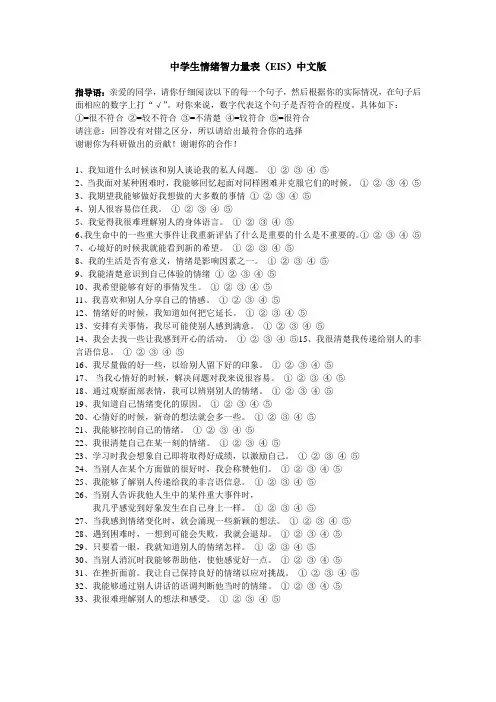
中学生情绪智力量表(EIS)中文版指导语:亲爱的同学,请你仔细阅读以下的每一个句子,然后根据你的实际情况,在句子后面相应的数字上打“√”。
对你来说,数字代表这个句子是否符合的程度。
具体如下:①=很不符合②=较不符合③=不清楚④=较符合⑤=很符合请注意:回答没有对错之区分,所以请给出最符合你的选择谢谢你为科研做出的贡献!谢谢你的合作!1、我知道什么时候该和别人谈论我的私人问题。
①②③④⑤2、当我面对某种困难时,我能够回忆起面对同样困难并克服它们的时候。
①②③④⑤3、我期望我能够做好我想做的大多数的事情①②③④⑤4、别人很容易信任我。
①②③④⑤5、我觉得我很难理解别人的身体语言。
①②③④⑤6、我生命中的一些重大事件让我重新评估了什么是重要的什么是不重要的。
①②③④⑤7、心境好的时候我就能看到新的希望。
①②③④⑤8、我的生活是否有意义,情绪是影响因素之一。
①②③④⑤9、我能清楚意识到自己体验的情绪①②③④⑤10、我希望能够有好的事情发生。
①②③④⑤11、我喜欢和别人分享自己的情感。
①②③④⑤12、情绪好的时候,我知道如何把它延长。
①②③④⑤13、安排有关事情,我尽可能使别人感到满意。
①②③④⑤14、我会去找一些让我感到开心的活动。
①②③④⑤15、我很清楚我传递给别人的非言语信息。
①②③④⑤16、我尽量做的好一些,以给别人留下好的印象。
①②③④⑤17、-当我心情好的时候,解决问题对我来说很容易。
①②③④⑤18、通过观察面部表情,我可以辨别别人的情绪。
①②③④⑤19、我知道自己情绪变化的原因。
①②③④⑤20、心情好的时候,新奇的想法就会多一些。
①②③④⑤21、我能够控制自己的情绪。
①②③④⑤22、我很清楚自己在某一刻的情绪。
①②③④⑤23、学习时我会想象自己即将取得好成绩,以激励自己。
①②③④⑤24、当别人在某个方面做的很好时,我会称赞他们。
①②③④⑤25、我能够了解别人传递给我的非言语信息。
①②③④⑤26、当别人告诉我他人生中的某件重大事件时,我几乎感觉到好象发生在自己身上一样。
情绪智力量表EIS
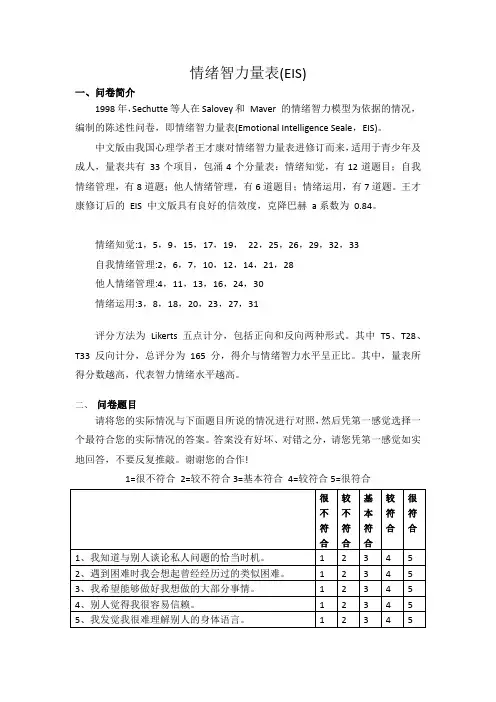
情绪智力量表(EIS)
一、问卷简介
1998年,Sechutte等人在Salovey和Maver 的情绪智力模型为依据的情况,编制的陈述性问卷,即情绪智力量表(Emotional Intelligence Seale,EIS)。
中文版由我国心理学者王才康对情绪智力量表进修订而来,适用于青少年及成人,量表共有33个项目,包涌4个分量表:情绪知觉,有12道题目;自我情绪管理,有8道题;他人情绪管理,有6道题目;情绪运用,有7道题。
王才康修订后的EIS 中文版具有良好的信效度,克降巴赫a系数为0.84。
情绪知觉:1,5,9,15,17,19,22,25,26,29,32,33
自我情绪管理:2,6,7,10,12,14,21,28
他人情绪管理:4,11,13,16,24,30
情绪运用:3,8,18,20,23,27,31
评分方法为Likerts 五点计分,包括正向和反向两种形式。
其中T5、T28、T33 反向计分,总评分为165 分,得介与情绪智力水平呈正比。
其中,量表所得分数越高,代表智力情绪水平越高。
二、问卷题目
请将您的实际情况与下面题目所说的情况进行对照,然后凭第一感觉选择一个最符合您的实际情况的答案。
答案没有好坏、对错之分,请您凭第一感觉如实地回答,不要反复推敲。
谢谢您的合作!
1=很不符合2=较不符合3=基本符合4=较符合5=很符合。
情绪智能量表(EIS)及评估标准(完整版)
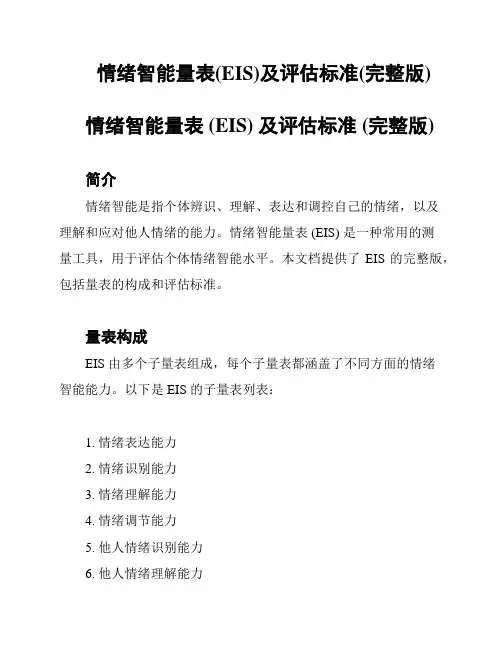
情绪智能量表(EIS)及评估标准(完整版)情绪智能量表 (EIS) 及评估标准 (完整版)简介情绪智能是指个体辨识、理解、表达和调控自己的情绪,以及理解和应对他人情绪的能力。
情绪智能量表 (EIS) 是一种常用的测量工具,用于评估个体情绪智能水平。
本文档提供了EIS 的完整版,包括量表的构成和评估标准。
量表构成EIS 由多个子量表组成,每个子量表都涵盖了不同方面的情绪智能能力。
以下是 EIS 的子量表列表:1. 情绪表达能力2. 情绪识别能力3. 情绪理解能力4. 情绪调节能力5. 他人情绪识别能力6. 他人情绪理解能力7. 他人情绪应对能力每个子量表都包含了若干个具体的情绪智能测试项,用于测量被评估者在相应能力方面的表现。
评估标准EIS 的评估标准根据被评估者在各个子量表上的得分来确定。
每个子量表都有不同的得分范围和评估等级。
评估等级通常包括以下几个级别:- 优秀:在该子量表上表现出很高的情绪智能水平,反应出卓越的情绪识别、理解和调控能力。
- 良好:在该子量表上表现出良好的情绪智能水平,具有较好的情绪识别、理解和调控能力。
- 一般:在该子量表上表现一般,需要进一步提升情绪智能水平。
- 低:在该子量表上表现较低,需要加强情绪智能的培养和训练。
根据被评估者在各个子量表上的得分情况,可以综合评估其整体情绪智能水平。
结语情绪智能量表 (EIS) 是评估个体情绪智能水平的有用工具。
通过测量多个子量表的值和对应的评估标准,可以有效评估被评估者在情绪辨识、理解和调控能力等方面的表现,为进一步提升情绪智能提供指导和参考。
希望本文档对您了解情绪智能量表及评估标准有所帮助。
如有任何疑问或需要进一步信息,请随时与我们联系。
情绪智力量表资料
情绪智力量表资料Schutle的EIS量表情绪智力量表(EIS)是由Schutle等人根据Salovey和Mayer(1990)的情绪智力模型开发的一份自陈问卷。
它有较高的信度和效度(Schutte,1998; Ciarrochi,2000).该量表的国内版本是由华南师范大学王才康把该量表翻译出来的,也验证了它的效度(a=0.83).所以本研究采用该量表来研究.该量表共有33项,可用于评估人们对自己以及他人情绪的感知、理解、表达、控制和管理利用的能力。
共四个维度,五级评分,其中5,28,33为反向计分,此量表的高分者通常更为积极、更能克制冲动、更清楚地表达自的感受、更好地恢复、较少的情感障碍和抑郁、更富有同情心、更能自我监控。
该量表是一份自陈问卷,包括33 个项目,采用5 点量表形式分别为一道五分,其中5,28,33题为反向计分,被试根据自己的符合程度来选择数字(1=很不符合,5=很符合)。
情绪智力是精确的知觉、评估和表达情绪的能力(情绪感知);接近或产生促进思维的情感的能力(运用情绪促进思维);理解情绪和情绪知识的能力(理解情绪);调节情绪和智力发展的能力(调控情绪)情绪知觉appraisal of own emotions:1、5 、9、15、17、19、22、25、26、29、32、33自我情绪管理(调控情绪)regulation of own emotions:2、6、7、10、12、14、21、28他人情绪管理(理解情绪)appraisal of other’s emotions empathy:4、11、13、16、24、30情绪利用(运用情绪促进思维)utilization of emotions:3、8、18、20、23、27、3173分以上情商良好,50~72分为情商一般,50分以下为情商低下appraisal of own emotions, regulation ofown emotions, utilization of emotions regulation of others’emotionsThe TTI Emotional Quotient report focuses on five areas within interpersonal and intrapersonal intelligence. Intrapersonal intelligence is the ability to understand oneself, while interpersonal intelligence is the ability to understand others.Self-Awareness–The ability to recognize and understand your moods, emotions and drives, as well as their effect on others.Self-Regulation– The ability to control or re-direct disruptive impulses and moods and the propensity to suspend judgment and think before acting.Motivation– A passion to work for reasons that go beyond money and status and a propensity to pursue goals with energy and persistence.Social Skills–A proficiency in managing relationships and building networks.Empathy– The ability to understand the emotional makeup of other people.Five Ways Emotional Intelligence Can Improve Relationships Many of us constantly work to become more intellectually intelligent, but how many of us have even thought about trying to become more emotionally intelligent? The truth is, many of us don't pay much attention to what we're feeling, and we should be! There is plenty of evidence showing that emotional intelligence boosts career success, enhances health, humor, and happiness, and contributes to relationship satisfaction. But how do we do it? Chade-Meng Tan, former Google engineer-turned-mindfulness expert believes there are five domains of emotional intelligence that can be worked on in order to reach this goal.Self-awarenessTan teaches that the first step to becoming more self-aware is to increase one's capacity to focus attention through meditation. He describes this as "the ability to bring the mind to a state that's calm and clear, and to do it on demand". This doesn't necessarily mean that you need to create a meditation room in your house. It simply means that in order to get in touch with your emotions, you ought to participate in relaxing activities that provide the opportunity for you to exercise your mind, such as walking, journaling, or participating in therapy. By getting in touch with your thoughts and feelings, you will become more emotionally "fit", and just as physical fitness improves many facets of your life, so will emotional fitness.Self-regulationBecoming aware of our thoughts and emotions isn't enough. We must also learn to control and regulate them. Many different types of relationships can be harmed when a person allows their emotions to run wild and has frequent angry outbursts, bouts of depression, or is continually coming close and then pulling away. You can learn to control your emotions better by using mindfulness to make connections with your emotions, thoughts, and bodily reactions. "A 2013 University of Utah study found that individuals with mindful personality traits (such as self- awareness and attentiveness) exhibited more stable emotional patterns and reported feeling more in control of their moods and actions. Brown University research also found that mindfulness meditation could improve an individual's control over brain processing of pain and emotions." See: Source MotivationIn order to increase and maintain a high level of emotional intelligence, we must be motivated to do the work necessary toget there. We can do this by making mindfulness a habit. Purposefully set aside a small amount of time each day for relaxation, reflection, and positive thinking. As you make this a priority, you will not only find that it will become easier over time, but that watching the benefits of it, such as self-balance and more harmonious relationships, will inspire you to continue moving forward.EmpathyUse part of your mindfulness and meditation time to reflect on compassion and loving-kindness for others. One Harvard study showed that doing thisincreases our willingness to consider others, and reach out to those in need. If we are thinking about others, and then taking action to help those around us, we will develop a greater sense of empathy as we become more aware of what life is like for other people. It is obvious to see how this would give us a new outlook on ourselves, make us better friends, more attentive lovers and family members, and compassionate co-workers.Social SkillsBettering our ability to interact with others increases our emotional intelligence, and gives us the tools to create stronger, healthier relationships. Harvard research shows that increasing social skills is the most coachable element of emotional intelligence, but we need help to do it. Self-help workbooks, individual therapy, support groups, and educational classes are all ways we can learn how to connect socially in more effective ways. Also, following the example of and learning from people in your life whom you admire and respect can guide you in the right direction.Putting more effort into increasing your emotionalintelligence will certainly pay off. However, it is not something that comes easily or immediately. You have to decide to find a place for it in your life, and take the time for action. If you do, not only will you find more strength, peace, and awareness within yourself, but you will also be more effective in developing meaningful relationships.。
基于能力测试的个人情绪智力量表
基于能力测试的个人情绪智力量表1.你的学校和班级是[填空题]2.你的名字和电话号码是[填空题]3.当你情绪很低落时,你会[单选题]○A尝试找一些事情来做,是自己觉得好一些。
○B不加理会,因为你知道自己的情绪会自然恢复正常。
4.当你心烦意乱时,你会[单选题]○A向一些和你亲密的人倾诉感受。
○B把精神集中在一些事情如工作、学习或嗜好上,藉以使自己离开不好的感受。
5.你的上司指定你做一件超越你工作范围的任务,而你又对这件额外的工作毫无兴趣,你会[单选题]○A说服自己这任务其实不是太差,并加以完成。
○B告诉你的上司,此任务超越你的工作范围,并要求他找另外适当的人选去负责此任务。
6.李学明前一份工作是在某公司的热线电话部门,负责回答及处理顾客的投诉。
他不喜欢此工作,所以便找了现在的工作,现在他任职一间零售店,职责是招待到零售店购物的顾客。
但是,他又发觉自己对处理无理顾客时感到非常厌恶。
如果你是李学明,你会[单选题]○A向那些对顾客服务有经验的人倾诉,并寻求他们的意见。
○B尝试接受多一些关于顾客服务技巧的培训和教育。
7.你是某一公司的部门主管,公司有两个互相竞争且关系恶劣的副总裁,他们都想控制你的部门,因此你经常左右为难,而且这情况导致一些公司的规定含糊不清,使你的部门很难正常运作。
面对这样的情形,你会[单选题]○A假装不知道两个副总裁的斗争,因为办公室政治是无可避免的,让他们争斗,而你跟从最后定案的规定。
○B尽你所能使规定清晰,藉以让你的部门可正常运作。
8.假设你赢取了一个很重要的奖项,你会[单选题]○A告诉每一个人并与他们分享你的快乐。
○B只告诉你的家人及最亲近的朋友,并与他们庆祝获奖。
9.当你要做一些你不喜欢的事情时,你会[单选题]○A尝试从中找出一些有趣的地方。
○B尝试尽快做完,然后忘记它。
10.你的男/女朋友很喜欢某一流行音乐明星。
你花了两个小时排队买了这明星音乐会的门票。
你约了男/女朋友在晚上七时半见面,但到八时半他/她还没有出现,你便自己进场。
情绪智力量表
情绪智力量表测评须知:本测验共33道题,完成时间大约5分钟。
题目1、我知道与别人谈论问题的恰当时机。
A. 完全不符合B. 不太符合C. 无法确定D. 基本符合E. 完全符合2、当我面对某种困难时,我能够回忆起面对同样困难并克服它们的时候。
A. 完全不符合B. 不太符合C. 无法确定D. 基本符合E. 完全符合3、我期望我能够做好我想做的大多数的事情A. 完全不符合B. 不太符合C. 无法确定D. 基本符合E. 完全符合4、别人很容易信任我。
A. 完全不符合B. 不太符合C. 无法确定D. 基本符合E. 完全符合5、我觉得我很难理解别人的身体语言。
A. 完全不符合B. 不太符合C. 无法确定D. 基本符合E. 完全符合6、我生命中的一些重大事件让我重新评估了什么是重要的什么是不重要的。
A. 完全不符合B. 不太符合C. 无法确定D. 基本符合E. 完全符合7、心情好的时候我就能看到新的希望。
A. 完全不符合B. 不太符合C. 无法确定D. 基本符合E. 完全符合8、情绪是决定我们生活有意义的重要因素之一。
A. 完全不符合B. 不太符合C. 无法确定D. 基本符合E. 完全符合9、我能清楚意识到自己每一刻的情绪A. 完全不符合B. 不太符合C. 无法确定D. 基本符合E. 完全符合10、我盼望能事事如意。
A. 完全不符合B. 不太符合C. 无法确定D. 基本符合E. 完全符合11、我喜欢和别人分享自己的情感。
A. 完全不符合B. 不太符合C. 无法确定D. 基本符合E. 完全符合12、情绪好的时候,我会想方法把他延长一些。
A. 完全不符合B. 不太符合C. 无法确定D. 基本符合E. 完全符合13、安排有关事情,我尽可能使别人感到满意。
A. 完全不符合B. 不太符合C. 无法确定D. 基本符合E. 完全符合14、我喜欢做能使自己感到高兴的事情。
A. 完全不符合B. 不太符合C. 无法确定D. 基本符合E. 完全符合15、我很清楚我传递给别人的非言语信息。
(完整word版)情绪智力量表
情绪智力量表亲爱的大学生朋友:你好!以下是一项关于大学生生活方面的研究问卷,谢谢你愿意协助完成。
你的回答将会对我们的研究工作提供非常有意义的信息,本问卷不用署名,并且所有回收的问卷都会保密。
感谢你的参与和帮助!年级:生源地性别:是否独生子女:1=大一1=城市1=男1=是2=大二2=城镇3=大三4=大四3=农村2=女2=否请你仔细阅读每一个句子,然后根据你的实际情况,在句子后面相应的数字上打“√字代表对你来说,是这个句子符合的程度,具体如下:1=很不符合2=较不符合3=不清楚4= 较符合5=很符合问题的回答没有对错、好坏之分,我们只是需要知道每个人的真实想法和实际作法。
的合作。
"。
数谢谢你题目很不较不不清较符很符符合符合楚合合1、我知道与别人谈论问题的恰当时机 1 2 3 4 52、我遇到困难时会想起以前遇到并解决同样困难的时 1 2 3 4 5 候3、我希望我能做好我想做的大多数的事情 1 2 3 4 54、别人觉得我很容易信赖 1 2 3 4 55、我发觉我很难理解别人的身体语言 1 2 3 4 56、人生中的一些变故改变了我的世界观 1 2 3 4 57、心境好的时候我就会看到新的希望 1 2 3 4 58、情绪是决定我们生活有意义的重要因素 1 2 3 4 59、我能清楚意识到自己每一刻的情绪 1 2 3 4 510、我盼望能事事如意 1 2 3 4 511、我喜欢与别人分享自己的情感 1 2 3 4 512、情绪好的时候,我会想方设法使它延长一些 1 2 3 4 513、安排有关事情,我尽量使别人感到满意 1 2 3 4 514、我喜欢做能使自己感到高兴的事情 1 2 3 4 515、我很清楚我传递给别人的非语言信息 1 2 3 4 516、我尽量做得好一些,使别人对我的印象好一点 1 2 3 4 517、我能察言观色辨别别人的情绪 1 2 3 4 518、心境好的时候解决有关问题容易一些 1 2 3 4 519、我知道我为什么情绪不好 1 2 3 4 520、心境好的时候新异的想法就会多一些 1 2 3 4 521、我能控制自己的情绪 1 2 3 4 522、我很清楚自己某一刻的情绪 1 2 3 4 523、工作时我会想象自己即将取得好成绩,来激励自己 1 2 3 4 524、发现别人在某一方面做得很好,我会称赞他25、我能理解别人传递给我的非语言信息 1 2 3 4 526、当别人告诉我他人生中经历的某件重大事件时,我 1 2 3 4 5 感觉上好象发生在自己身上一样27、心境变好时新颖的思想会大量涌现 1 2 3 4 528、遇到困难时一想到会失败,我就会退却 1 2 3 4 529、只要膘一眼,我就能知道别人的情绪好坏 1 2 3 4 530、当别人消沉时我能帮助他,使他感觉好一些 1 2 3 4 531、良好的心境有助于面对困难的挑战 1 2 3 4 532、我能通过别人讲话的语调判断他当时的情绪 1 2 3 4 533、我很难理解别人的想法和感受 1 2 3 4 5。
- 1、下载文档前请自行甄别文档内容的完整性,平台不提供额外的编辑、内容补充、找答案等附加服务。
- 2、"仅部分预览"的文档,不可在线预览部分如存在完整性等问题,可反馈申请退款(可完整预览的文档不适用该条件!)。
- 3、如文档侵犯您的权益,请联系客服反馈,我们会尽快为您处理(人工客服工作时间:9:00-18:30)。
Schutle的EIS量表情绪智力量表(EIS)是由Schutle等人根据Salovey和Mayer(1990)的情绪智力模型开发的一份自陈问卷。
它有较高的信度和效度(Schutte,1998; Ciarrochi,2000).该量表的国内版本是由华南师范大学王才康把该量表翻译出来的,也验证了它的效度(a=0.83).所以本研究采用该量表来研究.该量表共有33项,可用于评估人们对自己以及他人情绪的感知、理解、表达、控制和管理利用的能力。
共四个维度,五级评分,其中5,28,33为反向计分,此量表的高分者通常更为积极、更能克制冲动、更清楚地表达自的感受、更好地恢复、较少的情感障碍和抑郁、更富有同情心、更能自我监控。
该量表是一份自陈问卷,包括33 个项目,采用5 点量表形式分别为一道五分,其中5,28,33题为反向计分,被试根据自己的符合程度来选择数字(1=很不符合,5=很符合)。
情绪智力是精确的知觉、评估和表达情绪的能力(情绪感知);接近或产生促进思维的情感的能力(运用情绪促进思维);理解情绪和情绪知识的能力(理解情绪);调节情绪和智力发展的能力(调控情绪)情绪知觉appraisal of own emotions:1、5 、9、15、17、19、22、25、26、29、32、33自我情绪管理(调控情绪)regulation of own emotions:2、6、7、10、12、14、21、28他人情绪管理(理解情绪)appraisal of other’s emotions empathy:4、11、13、16、24、30情绪利用(运用情绪促进思维)utilization of emotions:3、8、18、20、23、27、3173分以上情商良好,50~72分为情商一般,50分以下为情商低下appraisal of own emotions, regulation ofown emotions, utilization of emotions regulation of others’ emotionsThe TTI Emotional Quotient report focuses on five areas within interpersonal and intrapersonal intelligence. Intrapersonal intelligence is the ability to understand oneself, while interpersonal intelligence is the ability to understand others.•Self-Awareness– The ability to recognize and understand your moods, emotions and drives, as well as their effect on others.•Self-Regulation– The ability to control or re-direct disruptive impulses and moods and the propensity to suspend judgment and think before acting.•Motivation– A passion to work for reasons that go beyond money and status and a propensity to pursue goals with energy and persistence.•Social Skills– A proficiency in managing relationships and building networks.•Empathy– The ability to understand the emotional makeup of other people.Five Ways Emotional Intelligence Can Improve RelationshipsMany of us constantly work to become more intellectually intelligent, but how many of us have even thought about trying to become more emotionally intelligent? The truth is, many of us don't pay much attention to what we're feeling, and we should be! There is plenty of evidence showing that emotional intelligence boosts career success, enhances health, humor,and happiness, and contributes to relationship satisfaction. But how do we do it? Chade-Meng Tan, former Google engineer-turned-mindfulness expert believes there are five domains of emotional intelligence that can be worked on in order to reach this goal.Self-awarenessTan teaches that the first step to becoming more self-aware is to increase one's capacity to focus attention through meditation. He describes this as "the ability to bring the mind to a state that's calm and clear, and to do it on demand". This doesn't necessarily mean that you need to create a meditation room in your house. It simply means that in order to get in touch with your emotions, you ought to participate in relaxing activities that provide the opportunity for you to exercise your mind, such as walking, journaling, or participating in therapy. By getting in touch with your thoughts and feelings, you will become more emotionally "fit", and just as physical fitness improves many facets of your life, so will emotional fitness.Self-regulationBecoming aware of our thoughts and emotions isn't enough. We must also learn to control and regulate them. Many different types of relationships can be harmed when a person allows their emotions to run wild and has frequent angry outbursts, bouts of depression, or is continually coming close and then pulling away. You can learn to control your emotions better by using mindfulness to make connections with your emotions, thoughts, and bodily reactions. "A 2013 University of Utah study found that individuals with mindful personality traits (such as self-awareness and attentiveness) exhibited more stable emotional patterns and reported feeling more in control of their moods and actions. Brown University research also found that mindfulness meditation could improve an individual's control over brain processing of pain and emotions." See: SourceMotivationIn order to increase and maintain a high level of emotional intelligence, we must be motivated to do the work necessary to get there. We can do this by making mindfulness a habit. Purposefully set aside a small amount of time each day for relaxation, reflection, and positive thinking. As you make this a priority, you will not only find that it will become easier over time, but that watching the benefits of it, such as self-balance and more harmonious relationships, will inspire you to continue moving forward.EmpathyUse part of your mindfulness and meditation time to reflect on compassion and loving-kindness for others. One Harvard study showed that doing thisincreases our willingness to consider others, and reach out to those in need. If we are thinking about others, and then taking action to help those around us, we will develop a greater sense of empathy as we become more aware of what life is like for other people. It is obvious to see how this would give us a new outlook on ourselves, make us better friends, more attentive lovers and family members, and compassionate co-workers.Social SkillsBettering our ability to interact with others increases our emotional intelligence, and gives us the tools to create stronger, healthier relationships. Harvard research shows that increasing social skills is the most coachable element of emotional intelligence, but we need help to do it. Self-help workbooks, individual therapy, support groups, and educational classes are all ways we can learn how to connect socially in more effective ways. Also, following the example of and learning from people in your life whom you admire and respect can guide you in the right direction.Putting more effort into increasing your emotional intelligence will certainly pay off. However, it is not something that comes easily or immediately. You have to decide to find a place for it in your life, and take the time for action. If you do, not only will you find more strength, peace, and awareness within yourself, but you will also be more effective in developing meaningful relationships.。
